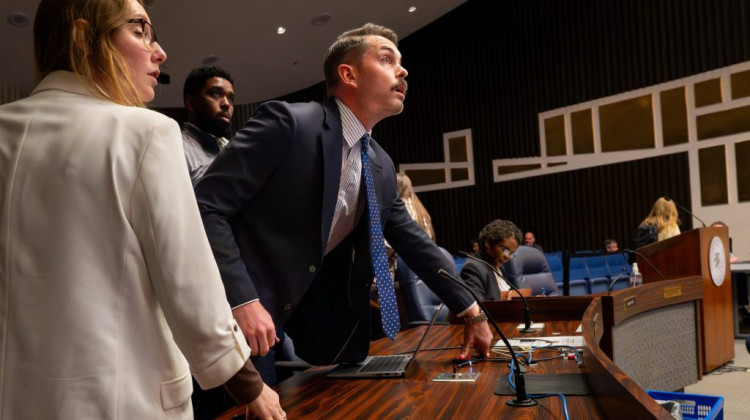
Herman Whitfield Jr. (left) and Gladys Whitfield (right) stand at a press conference July 1, 2022, outside of City Market. They are the parents of Herman Whitfield III, who died in police custody in April.
Tyler Fenwick/Indianapolis RecorderFor Gladys Whitfield, continuing to get in front of people and share this painful story is a responsibility. She and her husband, Herman Whitfield Jr., have spent the last four months standing at podiums and microphones, beside friends and family and strangers, hoping what happened to their son doesn’t slip out of the public’s consciousness.
“For me, it takes a lot of energy and will,” Gladys Whitfield said in an interview with the Recorder, “but my husband and I think because Tres can’t be here to talk about what happened to him, we have to say something.”
Tres was the family nickname for 39-year-old Herman Whitfield III, who died in police custody April 25 during an apparent mental health crisis. His parents have found themselves now in the spotlight, trying to reconcile the reality of their son’s death with the sting of telling his story.
‘We’re just trying to be patient’
It took two months for Indianapolis Metropolitan Police Department to release body camera footage, which shows a seemingly confused Whitfield running from the kitchen to the dining room, where one officer used a stun gun on him, and others detained him on the floor. He was pronounced dead at a hospital.
There have been two internal investigations from IMPD, one criminal and another administrative. After the coroner’s office ruled Whitfield’s death a homicide in July, a police spokesperson said IMPD’s Critical Incident Response Team finished the criminal investigation and presented the case to the Marion County Prosecutor’s Office.
Meanwhile, Whitfield’s family filed a wrongful death lawsuit against the city and police officers involved in his death, alleging they used excessive force.
All of that has led to a lot of waiting.
“I understand that it’s a process,” Gladys Whitfield said. “It’s a legal process considering criminal charges against members of law enforcement. I’m assuming it takes time.”
“We’re just trying to be patient,” she said.
Patience is difficult, but she said she doesn’t want anything to be rushed.
“Our son is dead,” Gladys Whitfield said. “That’s the main thing we think about over and over, that our son’s dead and he’s not coming back. Now all these things after the fact, they just take time.”
Among other demands, the family wants the Department of Justice and FBI to investigate the incident and IMPD policies and practices.
The family also wants IMPD to release the full, unedited body camera footage for officers at the home that night, saying the version police released in June is “selective and biased.”
Gladys Whitfield said police told them they weren’t allowed to leave the house after their son was taken to the hospital and that police didn’t give a reason for why they couldn’t leave.
Asked to respond to the family’s accusation and if the department plans to release the full, unedited body camera footage, an IMPD spokesperson declined to comment because of the pending litigation.
Whitfield’s parents credit groups like Faith in Indiana for their support. Faith in Indiana has been active in bringing a clinician-led crisis response team to Indianapolis. The city plans to start a pilot for the program early next year as part of a new division dedicated to mental health. There is also a Change.org petition with the family’s demands that has about 1,200 signatures.
“Even though I may not have talked to any of those people, and I don’t think I have, but to have a thousand signatures, that means somebody’s on our side,” Gladys Whitfield said.
‘Confused and disoriented’
Herman Whitfield III was never diagnosed with a mental health condition, according to his family, but in hindsight his mother believes it’s possible he could have been.
“He just seemed to be kind of sad at home,” she said. “I noticed he was sad. Sometimes he didn’t want to talk to us.”
Gladys Whitfield said she called 911 in the early morning hours of April 25 because her son seemed “confused and disoriented.”
“He wasn’t violent in any sort of way,” she said, “but my husband and I thought he needed medical attention.”
Gladys Whitfield told the dispatcher her son was having “some sort of episode” as he could be heard in the background arguing with his father.
When officers arrived, Herman Whitfield Jr. can be heard saying, “You guys should have called an ambulance,” but it doesn’t appear officers acknowledged or responded to him.
“We just assumed that if we call for medical help, they’re going to send out the people who render medical assistance,” Gladys Whitfield said. “We don’t understand who’s coming out or what their uniform may say or look like or what their official title is or their training.”
The family is hopeful a clinician-led crisis response team can lead to better outcomes for people in their position in the future, but there’s no guarantee of that.
“We never got a chance to find that out,” Herman Whitfield Jr. said.
The city has a unit — the Mobile Crisis Assistance Team, or MCAT — that responds to mental health calls, but it doesn’t operate 24/7 and wasn’t available when Gladys Whitfield called 911.
A spokesperson for IMPD previously told the Recorder that police were dispatched on a disturbance run, not a mental health run, so MCAT wouldn’t have initially responded anyway. It’s possible that MCAT could have gotten involved later, though.
‘I can write better music than that’
Like so many others, Herman Whitfield Jr. will remember the way his son played piano. It was “just so very smooth,” he said.
“Sometimes he would play for me just to help me relax after a long day,” he said.
Herman Whitfield III was interested in drums first when he was about 3 or 4 years old. His parents can’t remember exactly how or when he turned to piano, but it probably had something to do with growing up in the church and hearing gospel music. They eventually found him lessons.
He also enjoyed writing music and told his parents one day that he listened to all types of music.
“I can write better music than that,” he told them.
It was the mid-1980s, and Herman Whitfield III was writing music by hand until his parents splurged on a computer and got a music-writing program.
He went on to twice win the Detroit Symphony Orchestra’s Annual Emerging Composers Readings national competition, according to Indy Arts Guide. The Indianapolis Symphony Orchestra premiered his piece, Scherzo No. 2 in E minor by Herman Whitfield III, in 2006.
Gladys Whitfield said the family may host an event for people to learn more about her son and “acknowledge that he was here on Earth and did good things.”
Contact Indianapolis Recorder senior staff writer Tyler Fenwick at (317) 762-7853 or email tylerf@indyrecorder.com. Follow him on Twitter @Ty_Fenwick.
 DONATE
DONATE






 Support WFYI. We can't do it without you.
Support WFYI. We can't do it without you.